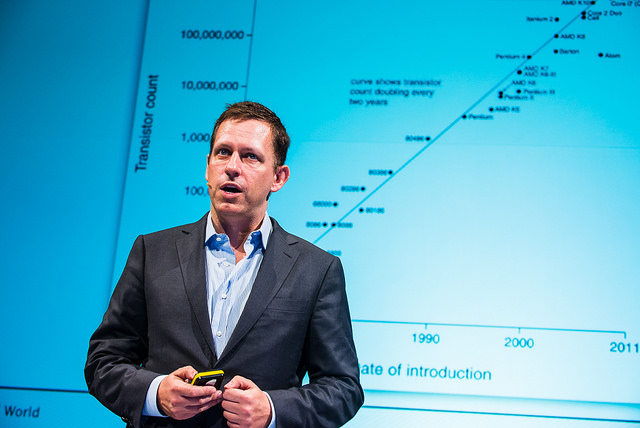Peter Thiel on randomness in biology
12 Sep 2015
In a recent interview with the MIT technology review Peter Thiel discusses the Founders Fund investment in Stemcentrx and the inherent randomness of biology.
There is constantly a comparison being made today between software and biology and with this comparison there is an expression of desire for a time when we can bend biology to our will with the deterministic confidence of programming.
In the article Thiel says “A big difference between biology and software is that software does what it is told, and biology doesn’t.”. This made me think about learning to program, I think we’ve all had the experience of executing a script and it doing something unexpected but this isn’t the interpreter doing something random, its doing what is was told to do, however we might not have fully specified what we want. This observed variance happened because I didn’t properly understand how the interpreter would interpret my instructions.
Maybe this is the case in biology? Where we think we know what we’re doing when we stick a plasmid into a bacterium but maybe we missed some important regulation system. Like my programming we think we know what we’re telling biology to do but actually our understanding of how our instructions are interpreted are still not fully understood.
Maybe this breaks down, biology is dependent on stochastic processes where programming is deterministic. That said though the underlying physical phenomena of computing is dictated by manipulating population distributions of electrons and holes, but we’ve built levels of hardware and software abstraction on top of these manipulations to allow us to have well engineered deterministic systems.
This then is surely where the importance of robotic automation and software lies, providing layers of abstraction on top of biological processes to make them appear deterministic where actually they may not be. For example instructing the transformation of plasmid x into bacterium y and the system determining quantities and selection steps to ensure a near absolute outcome.
Thiel continues:
One of the challenges with biotechnology generally is that biology feels too complicated and too random. It feels like there are too many things that can go wrong. You do this one little experiment and you can get a good result. But then there are five other contingencies that have to work the right way as well. I think that creates a world where the researchers, the scientists, and the entrepreneurs that start companies don’t really feel that they have agency [emphasis added].
Thiel nails it on the head with that one. During my PhD there were times when I felt I lacked agency over the systems I was experimenting with, but maybe that’s what science is like. With science we play with a lot unknown unknowns.
Thiel on the suggested contradiction of investing in Emerald Cloud Lab and Stemcentrx (outsource vs in house):
There are many experiments you can outsource. But if you are trying to build an end-to-end next-generation pharma company, then actually doing a lot of these things internally is correct. The ability to do complex coordination of different pieces of a business and make them work together is a very underrated entrepreneurial skill. I think that is what Elon Musk has done really well at Tesla, doing end-to-end car assembly, and owning all the stages of the process. This turns out to be really critical. Some other electric car competitors outsourced key components and then the people they relied on ended up being unreliable or failing.
This idea was very much in my mind by the time we invested in Stemcentrx in 2012. They had an annoyingly complicated problem, all these pieces you have to bring together, and they said, “We are just going to do it ourselves.” That is a mind-set that I very deeply share. I don’t want to name names, but there are other companies where, in some ways, this was the key thing that failed.
I’m actually surprised he said this. It’s a fairly superficial response and I’d love to see an elaborated answer. I imagine he is most likely referring to development of animal models, as this is certainly very far off from cloud-science providers, even with Mousera on the horizon I am still wondering how customisable these animal models may be.
Anyway Thiel is always interesting I recommend reading his book Zero to One and also watch this video of him and Gary Kasparov putting the world to rights for an evening.
Photograph of Peter courtesy of Heisenberg Media